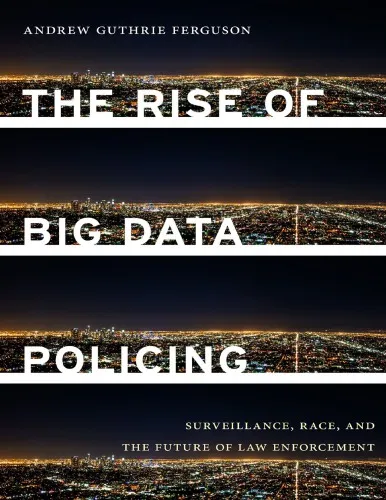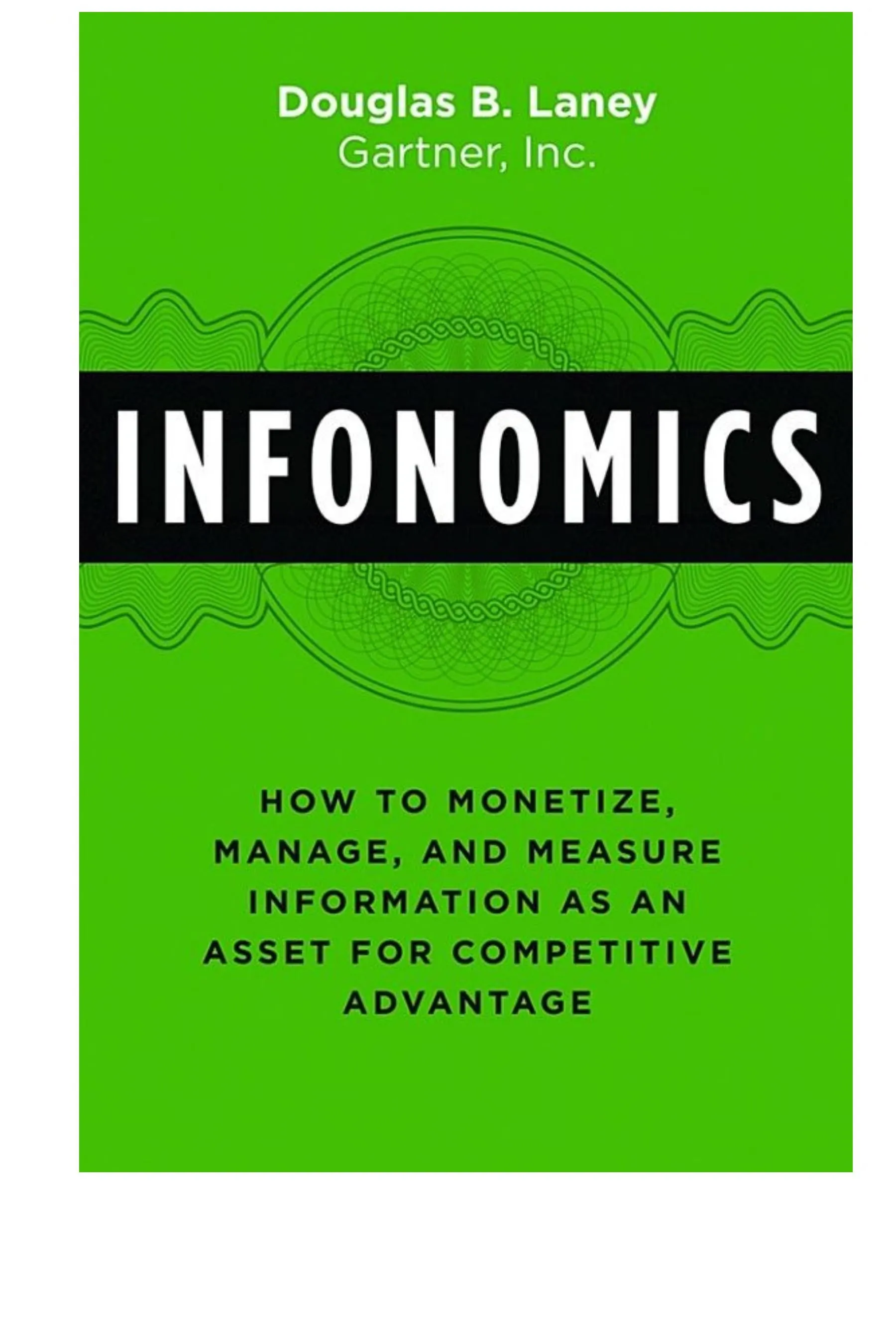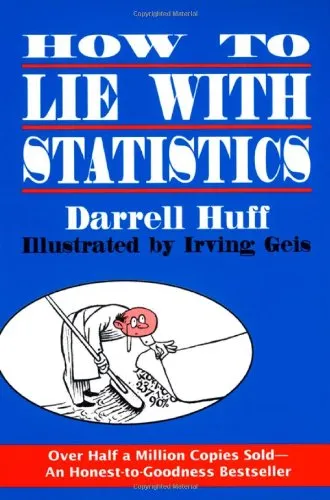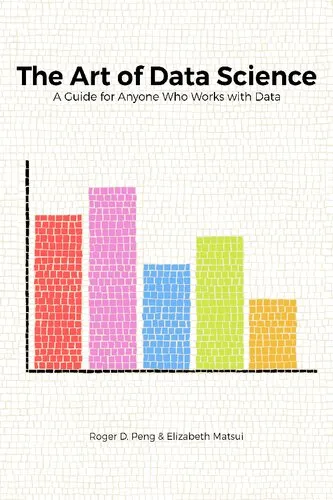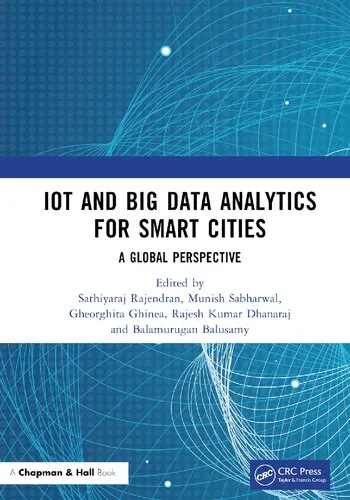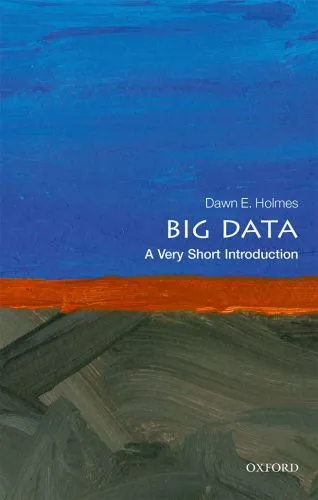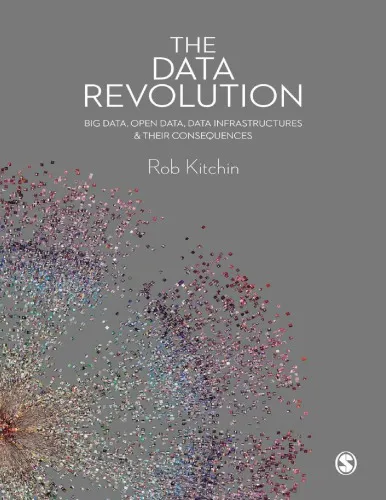The rise of big data policing : surveillance, race, and the future of law enforcement
4.4
بر اساس نظر کاربران

شما میتونید سوالاتتون در باره کتاب رو از هوش مصنوعیش بعد از ورود بپرسید
هر دانلود یا پرسش از هوش مصنوعی 2 امتیاز لازم دارد، برای بدست آوردن امتیاز رایگان، به صفحه ی راهنمای امتیازات سر بزنید و یک سری کار ارزشمند انجام بدینکتاب های مرتبط:
مقدمهای جامع بر کتاب "The Rise of Big Data Policing: Surveillance, Race, and the Future of Law Enforcement"
کتاب "The Rise of Big Data Policing" نوشته اندرو گاتری فرگوسن یک اثر برجسته و تأثیرگذار است که درک کاملی از تأثیر تکنولوژیهای بزرگ داده (Big Data) بر سیستمهای پلیسی و عدالت کیفری ارائه میدهد. این کتاب با تمرکز بر تغییرات اجتماعی و فناوری، به بررسی نقشی که Surveillance، الگوریتمها و دادههای بزرگ در بازسازی روشهای اجرای قانون ایفا میکنند، میپردازد.
خلاصهای از کتاب
فرگوسن در این کتاب، چگونگی نفوذ تکنولوژیهای نوین و استفاده از دادههای بزرگ در نظارت اجتماعی، بازداشتها و پیشبینی جرم را مورد بررسی قرار میدهد. این اثر نشان میدهد که چگونه ابزارهای Big Data میتوانند نابرابریهای نژادی و طبقاتی موجود را گسترش دهند و همچنین خطرهای استفاده بیش از اندازه از Surveillance و تحلیل الگوریتمی رفتارها را آشکار میکند. نویسنده با استناد به مطالعات متعددی، به تحلیل نحوه استفاده پلیس از ابزارهایی مانند دادههای تصویری دوربینها، شناسایی چهره و استفاده از الگوریتمهای پیشبینی جرم و رفتارهای انسانی میپردازد.
این کتاب نهتنها چالشها و ریسکهایی که Big Data به ارمغان میآورد را بررسی میکند بلکه فرصتها و احتمالات مثبت آن برای آینده عدالت کیفری را نیز مورد توجه قرار میدهد. فرگوسن سؤالاتی کلیدی در خصوص قانونی بودن، اخلاقیات، و عواقب اجتماعی این فناوریهای مدرن مطرح میسازد.
نکات کلیدی کتاب
- نحوه عملکرد ابزارهای Big Data در سیستمهای پلیس و اجرای قانون.
- ارتباط میان Race و نحوه سوءاستفاده احتمالی این تکنولوژیها از طریق نابرابری سیستماتیک.
- چالشهای حقوقی و اخلاقی ناشی از استفاده از Surveillance در فضای عمومی.
- بررسی فناوریهای پیشرفته مانند predictive policing و استفاده از دادههای ترکیبی.
- اهمیت شفافیت، پاسخگویی و نظارت بر فناوریهای جدید در سیستم عدالت کیفری.
جملات معروف از کتاب
"Big Data policing is not just a policing innovation—it is a societal shift."
"The predictive promise of big data is also a racialized reality."
"Technology can amplify bias if left unchecked."
چرا این کتاب مهم است؟
این کتاب به یکی از مهمترین موضوعات عصر حاضر، یعنی تقاطع تکنولوژی و عدالت اجتماعی، میپردازد. با ظهور Big Data و پیشرفتهای مداوم در فناوریهای نظارت، بحث درباره نحوه استفاده از این ابزارها برای ارتقای امنیت عمومی و جلوگیری از تخلفات اهمیت بالایی پیدا کرده است. از سوی دیگر، این فناوریها میتوانند تاثیراتی عمیق بر جوامع آسیبپذیر داشته باشند، و فرگوسن با بررسی این موضوعات، درک کاربران از ماهیت اصول اخلاقی و قانونی مرتبط با آن را افزایش میدهد.
این اثر نه فقط برای وکلا و فعالان حقوق بشر، بلکه برای تمامی شهروندان جامعه امروز حیاتی است، زیرا به آنها کمک میکند نقشی فعالتر در نظارت بر فناوریهایی که هر روز بر زندگی آنها تأثیر میگذارند، داشته باشند.
Introduction to "The Rise of Big Data Policing: Surveillance, Race, and the Future of Law Enforcement"
"The Rise of Big Data Policing" delves into the transformative power of data technologies in reshaping the way law enforcement operates in modern society. Written by Andrew Guthrie Ferguson, this book explores the promises and perilous consequences of applying big data analytics in policing. It navigates key themes such as surveillance, racial bias, privacy, and the ethical dilemmas raised by these sophisticated systems.
As cutting-edge data technologies like algorithms, predictive policing, and surveillance tools become increasingly central to law enforcement efforts, this book lays out a reality where our collective behavior is continuously monitored and evaluated for risk. Ferguson takes readers on a journey to understand both the capabilities and limitations of these emerging technologies while grappling with their unsettling social effects—particularly in marginalized communities.
By blending real-world case studies with thoughtful analysis, Ferguson not only critiques the flaws in these systems but also sheds light on their potential to strengthen law enforcement practices if used thoughtfully. Let’s break down the essence of this thought-provoking work and its relevance in today’s digital age.
Detailed Summary of the Book
In "The Rise of Big Data Policing," Ferguson uncovers how technological advancements are redefining law enforcement. The narrative starts with an explanation of big data—massive volumes of information generated from social media, smartphones, surveillance cameras, and other digital sources—and its incorporation into predictive policing systems.
Ferguson analyzes how these systems aim to predict criminal activity by crunching huge datasets to identify patterns, forecast areas with high crime risks, and even flag individuals considered likely to commit crimes. While these tools promise efficiency and crime prevention, they raise significant questions about accuracy, accountability, and fairness.
The author doesn’t shy away from addressing the racial dimension of big data policing. Ferguson critiques how surveillance technologies often disproportionately target Black and Brown communities, reinforcing existing biases under the guise of scientific objectivity. He also explores the historical context of mistrust between law enforcement and minority communities, perpetuated by discriminatory practices that are now being amplified in the digital age.
Additionally, the book examines the ethical and constitutional challenges of integrating surveillance and big data into policing. Privacy rights, due process, and the potential for abuse of power are themes Ferguson returns to repeatedly, urging readers to consider how these concerns impact democratic freedoms. Yet, the book remains balanced by showcasing how data analytics, when used responsibly, can also improve public safety, allocate law enforcement resources more effectively, and enhance accountability within police forces.
Key Takeaways
- Big data technologies are already shaping the future of law enforcement, for better or worse.
- Predictive policing tools and surveillance systems often replicate—and sometimes exacerbate—existing racial biases.
- The application of big data in policing raises severe privacy, ethical, and constitutional concerns.
- If designed and implemented ethically, big data tools can enhance transparency and justice in policing.
- Citizens and policymakers must actively question how these technologies are being deployed to ensure they serve the public good without undermining individual liberties.
Famous Quotes from the Book
"Big data has promised to solve the messy and often subjective decision-making of policing, but in doing so, it has transformed the concept of public safety into a statistical exercise."
"As predictive technologies enter the world of policing, they bring with them the potential to amplify inequities and perpetuate a cycle of mistrust, particularly in communities of color."
"Policing in the twenty-first century is increasingly about data—who controls it, how it is used, and, perhaps most importantly, who gets policed because of it."
Why This Book Matters
"The Rise of Big Data Policing" stands as a critical work for anyone concerned about the intersection of technology, justice, and civil rights in the digital age. With law enforcement rapidly integrating advanced analytics and surveillance techniques into daily practices, Ferguson's insights hold vital relevance for policymakers, activists, and ordinary citizens alike.
As society grapples with calls for police reform and debates about how technologies like artificial intelligence should be regulated, this book offers a measured yet urgent voice. It challenges readers to question the unchecked growth of surveillance systems while advocating for a larger conversation about fairness, accountability, and humanity in policing. In a world increasingly driven by data, books like this are essential for understanding the risks—and opportunities—of technological transformation.
دانلود رایگان مستقیم
شما میتونید سوالاتتون در باره کتاب رو از هوش مصنوعیش بعد از ورود بپرسید
دسترسی به کتابها از طریق پلتفرمهای قانونی و کتابخانههای عمومی نه تنها از حقوق نویسندگان و ناشران حمایت میکند، بلکه به پایداری فرهنگ کتابخوانی نیز کمک میرساند. پیش از دانلود، لحظهای به بررسی این گزینهها فکر کنید.
این کتاب رو در پلتفرم های دیگه ببینید
WorldCat به شما کمک میکنه تا کتاب ها رو در کتابخانه های سراسر دنیا پیدا کنید
امتیازها، نظرات تخصصی و صحبت ها درباره کتاب را در Goodreads ببینید
کتابهای کمیاب یا دست دوم را در AbeBooks پیدا کنید و بخرید
1421
بازدید4.4
امتیاز0
نظر98%
رضایتنظرات:
4.4
بر اساس 0 نظر کاربران
Questions & Answers
Ask questions about this book or help others by answering
No questions yet. Be the first to ask!
